Text
Why I Am Forever in Debt To Football
I fell in love with football at a very young age, as my father is the athletic trainer at the high school where I played at. He was there for twenty years before I played, and I was always the water boy on the sidelines, even at a young age. I always had great interactions with the players, and seeing the Greenwich community made me fall in love with the game, hoping to one day be one of the players that everyone was cheering for. One specific memory I have, is in my father’s training room, where after the game, one of the players came and took me into the locker room and had me sit in on the post-game speech that head coach John Marinelli was giving. I always watched football but never started playing until the fourth grade. Up until that point, there were rules against kids joining the Greenwich Youth Football League if they weren't living in Greenwich. I, being from Norwalk, Connecticut, had to wait until the rule was changed to accept everyone. Once said rule was changed, my father and I worked tirelessly to convince my mom to let me play. My dad, hoping to see his kids in the very games he covers one day, pushed the hardest. My mom eventually gave in, and I joined the Cos Cob Crushers, part of the GYFL (Greenwich Youth Football League).
I still remember my very first practice. It was a particularly warm September afternoon. I vividly remember Coach Tesh Durvasula introducing himself to my friend Dylan and me, who were lifelong best friends. He brought Dylan over to the running backs and brought me to the position that would change my life, the offensive line. I was a rather large kid, always towering over my classmates, and Coach Tesh saw potential in me. I will never forget the first practice after a game, where he gave out York Patties for pancakes, and Crunch Bars for big hits. I was a year behind everyone else due to the restrictions, so I didn’t expect to hit the ground running as much as I did. I won my first couple of York Patties in my first game, signifying one of many accomplishments I would achieve throughout my career.
Fast forward to my second to last season of the GYFL. We were about a third of the way through the season, and spirits were high. I was playing on both sides of the ball that season, hoping to help my team in any way possible. Little did I know, two of my future teammates, James Wailgum, and Jake Kiernan, would be involved in major injuries which, to this day, altered my football career. I was going in for a tackle-for-loss, a tackle that resulted in a loss of yardage for the opposing team. I broke through the line of scrimmage, shedding blocks along the way, ultimately reaching the quarterback, James Wailgum. I wrapped him up, and prepared to lift him backward, when suddenly another teammate of mine, Jake Kiernan, came to assist in the tackle from the front. The sudden collision twisted my right leg, which resulted in multiple ligament tears, effectively damaging my entire knee. Being on the ground not being able to feel my leg, I didn’t expect my father, an athletic trainer, to come over to me and tell me to “walk it off”. I still joke about it with him today as one of his worst assessments of an injury ever. He made me walk the entire way to the parking lot by myself, while he had an open seat in his golf cart for crying out loud! All jokes aside, my dad was the most helpful person during the many sessions of surgery, physical therapy, and strengthening. Although my mom was extremely concerned, I made a return to football after a strenuous nine months of recovery. From that point on, I’d wear knee braces. Originally thinking it was a bad thing, I was against wearing them. However, when you watch an NFL game, most linemen wear braces to protect against injury. That made me switch my perception of braces and made me think they were cool. Although the way I played football changed from there on out, things would only get better.
I went on to finish my youth career and started my time in high school. As I mentioned before, my biggest dream was to play in front of the legendary crowds that Greenwich High School Football games drew. I won many games, learned many lessons, and made countless friends, however, I think the most full circle moment for me was in my senior season, when we had the first night game at our brand-new stadium. It was GYFL night, a night where every GYFL player got in for free, and wore their jerseys. They all lined up around the entrance to the field, where we ran through a banner every game. That crowd was unlike anything I’d ever experienced before. Everywhere I looked, there was a mob of people, cheering us on as we awaited our run onto the field. Seeing the young kids in their GYFL jerseys which I once wore brought a tear to my eye, as I was in shock, feeling for the first time what the entire town’s support feels like. I played one of the best games of my career that night, registering a grade of well above ninety percent, which is very difficult to do as an offensive lineman. There was even a cutout of my face in the student section, something I didn’t ever even imagine was possible. That night was one of many memorable moments from my time as a Cardinal. Unfortunately, my time as a Cardinal would soon come to an end.
When the offseason rolled around, I realized a new dream of mine was possible to achieve: playing college football. After many conversations with coaches at every level of collegiate football, I decided that Endicott College would be the best choice for me. So far, it has been an unforgettable experience. We defeated the number 5 team in the nation en route to winning our third straight conference championship. That night was the most memorable thus far, as it shook the entire Division III scene, alerting teams to our potential playoff presence. Upsetting such a high ranked team in the dominant fashion that we did put everyone on notice, and that night, it felt like we were unbeatable. I’ve learned so many things in my first year as a Gull, and cannot wait to learn much more.
Although the memories mean a lot to me, football has been a guiding force in my life. When I needed a purpose, it gave me one. When I needed guidance, it guided me. Even at the lowest time of my life, it gave me lifelong friendships and lessons that I can lean on to get through just about anything. Football means so much to me, and I will forever be in debt to the game.
0 notes
Text
Greenwich Football Through The Eyes of Drew Falla
I’ve played football all my life. Not one day has gone by where something football related fails to make an appearance. Growing up in Norwalk, Conn., you would think I would attend my local high school. If you assumed that, you would be wrong. Both of my parents work at schools in Greenwich. My mother, an elementary school teacher at Cos Cob Elementary, spends her day teaching kids to read, write, and learn. My father, the head athletic trainer at Greenwich High School, spends his days evaluating, taping, and rehabbing athletes. I attended both of the schools they work at throughout my K-12 years. Playing football since 3rd grade, I had developed a tight bond with the sport, relying on it for structure, exercise, and a social life. What makes football so special, is all of those listed things are easily accessible due to the nature of the sport.
My time at Greenwich High School, in the Greenwich Football program, was the most influential time of my life. There were many highs, and many lows, but at the highs, seemingly every single time, was my experiences on the Greenwich Football team. Playing all four years, at the Freshman, JV, and Varsity levels, I learned countless different lessons from countless different people. My head coach, Anthony Morello. A recent father to his newborn son, Beau, Coach Morello was appointed as the leader of Greenwich Football in 2019, the same year I joined the program. On our first day doing a team workout, he walked over to the offensive line group that had just gotten to know each other, and he told us how important we were going to be to the team’s success. I knew from the day I met him that my class, with his guidance, would go on to do incredible things. I was correct. My class went to the playoffs three years in a row, winning the state championship in our senior season. Probably the most memorable moment during my career as a Cardinal is right before the state championship, the team has a tradition called “The Burning of the Shoes”, which essentially is where seniors first huddle around a pair of burning old cleats, signifying change in the near future. I’ll never forget when an exchange student we had, who never really spoke, came to the front and let us all know we felt like family to him. None of us really expected that from him, but it just goes to show how being part of a stable culture can influence someone’s life. We all ended up speaking, usually remembering times we felt truly loved by our teammates and coaches. I still remember exactly what Coach Morello was wearing on the day of the championship. It was frigid night at Rentschler Field in East Hartford, Connecticut, but of course, Coach Morello was wearing a cut off t-shirt underneath a vest with a beret on his head. When the final whistle blew, Coach got Gatorade dumped on him, and as people who know him best would expect, he screamed and threw up his arms in excitement, truly encompassing Coach Morello in a moment.
Amongst my class were teammates that would go on to become my best friends. I’d argue the sense of brotherhood between us is unmatched. Ultimately, it stems from the trials and tribulations we undergo as a group through summer workouts, preseason, games, and offseason lifts. The coaches help to build this atmosphere where we’re all on the same level, working toward a common goal. One day I remember very clearly is after a lift, where we all had to do wall sits and pass around a forty-five pound plate. We all were nearly in tears, as we didn’t want to let eachother down. All of this being said, I believe the biggest driving factor for Greenwich Football’s success is its connection to the town and former players. Once you play for Greenwich, you become a Cardinal for the remainder of your life. Regardless of records, rings, or accolades, everyone who played for Greenwich can all represent the Cardinals, because they put in the hard work with their teammates day in and day out. Everyone played at The Nest. Everyone had the logo on their helmet. Everyone wore the red and white jersey. At the end of the day, it’s a sense of pride that doesn’t leave you even beyond your lifetime. Legends such as Steve Young and John Sullivan will be remembered in Greenwich for generations to come. Yes, Steve Young did win a superbowl and yes, John Sullivan was a starting center for a long time in the NFL, but in Greenwich, they’ll be remembered because they were Cardinals. A specific example of this is the yearly Thanksgiving game against Staples High School. Especially when at the Nest, former Cardinals, including myself, flock to the game and all hang out at a barbeque before and watch together in the stands during the game. Regardless of what everyone has going on in their lives, they made time to come down and watch their former team play.
What makes Greenwich Football so special isn’t the championships, all-time wins, or the all-state selections. It’s each individual within the program striving to create an atmosphere in which everyone feels a sense of pride and accomplishment during their time there, and beyond. All of the alumni hurry back at any chance they get. Even I, in my first year out of high school, felt the tie to Greenwich pulling me back to the bird at the 50 yard line. The team is the foundation of the town, where everyone can feel united, chanting loudly on Hillside Road, “Go Big Red!”.
0 notes
Text
Helping Athletes and Raising Men:
A Look Into Peter Falla’s Life
Pete Falla, who grew up in Norwalk, Connecticut, still resides there to this day. He and his wife, Kathleen Falla have two sons and a dog, which inspires them to give their all each and every day to make a difference. Pete works as an athletic trainer and physical therapist. He is beloved by the community and for almost thirty years, he’s been wrapping ankles, handing out ice, and inspiring young athletes.
Pete Falla’s daily routine begins with his alarm waking him up in the morning. On a cold morning in Norwalk, Pete feels the need to start every morning early in order to truly prepare himself for what’s to come. After he gets himself ready, he awakens his kids and brings them to school before he goes to work. Every single day, Pete works to provide for his growing family and pursue his aspirations to better the lives of athletes across the town.
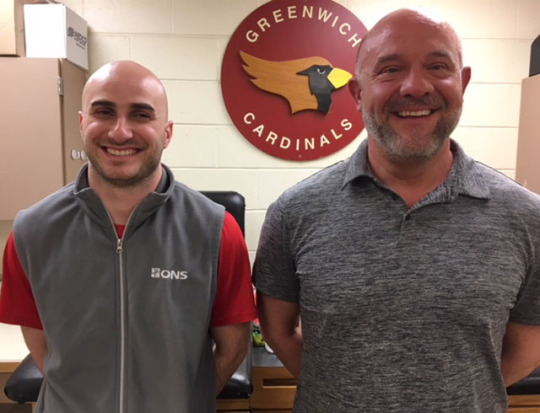
Pete in his training room (fciac.net)
It’s these mornings in which Peter reflects on his day to come. The relaxing noises of the car drive to Greenwich help to calm him and prepare him for his change from the everyday dad to arguably the best athletic trainer, who is always dedicated to his athletes.
He starts his day at ONS (Orthopedic and Neurosurgery Specialists), where Peter works within the field of physical therapy. Here, he puts his years of knowledge and experience to use to help patients and athletes fully heal within their rehabilitation. Because he has experience in both athletic training and physical therapy, he can really personalize the treatments, which is in the favor of his patients.
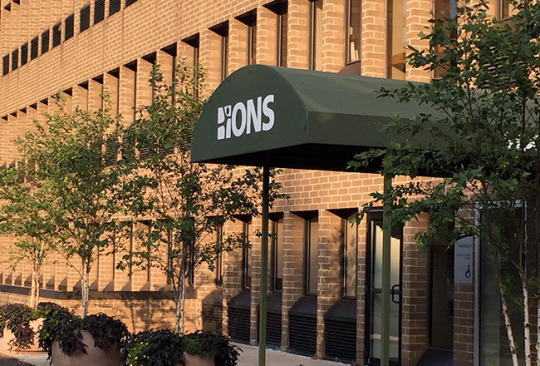
ONS, the company which Pete is a physical therapist for. (https://westfaironline.com)
When afternoon arrives, Pete finds himself at Greenwich High School. In his training room, Pete fosters a community in which athletes can socialize and find support. Pete believes whole-heartedly that training rooms deserve to be judgment-free zones, where athletes can express themselves and feel at home.
In the late afternoons and evenings, Pete resides at the high school. There, he watches over the games and practices taking place across the campus. His goal is to keep all of the kids healthy and happy on the field. Pete’s passion stems from helping others, and it’s this nature that makes him such an inviting and caring individual.
Within the walls of Greenwich High School lies Pete’s training room. In the new, state of the art athletic training facility, Pete tapes, evaluates, and rehabilitates his athletes in order to get them in the best shape possible to compete. “The training room in many high schools can act like a safe haven to athletes who all find themselves in a common situation dealing with injury”, Falla proclaims. The room is decorated with pictures of Pete’s family, tape, scissors and much more equipment to aid Pete throughout the day. One of his most prized possessions, his snack cabinet, holds the key to Pete getting through the long tedious days. The cabinet is a symbol of comfort, where Pete can go to get a tasty treat if he feels the need. Right below the cabinet is his old PC, where he types up injury reports, studies treatments, and watches away sports games.
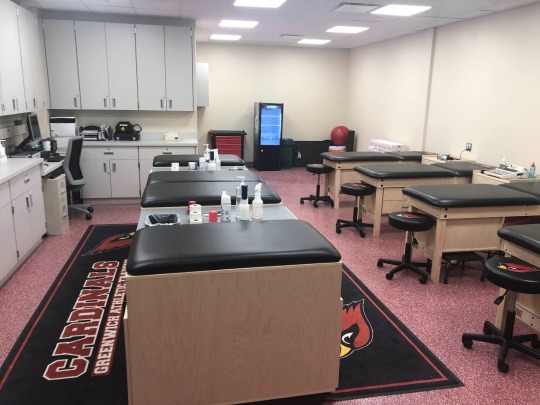
Pete’s training room.
His desk, while imperative to Pete’s success, isn’t the most important location in the training room. That designation would belong to his brand new treatment tables. On these leather covered, folding tables is where Pete exercises most of his practice. He can assess injuries quickly, assign treatment, and have athletes in and out of the training room efficiently due to the set up of the room. The athletes are free to use the table whenever they so please, which in turn leads to socialization as well. This area creates a common ground between everyone, and whether you’re an all-state caliber player, or a practice squad player, Pete says “It provides a quiet space to speak openly about their injuries without fear of judgment by the coaches or other teammates”.
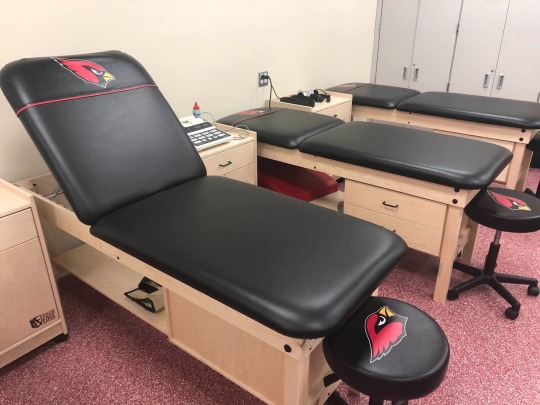
Training table in Pete’s training room.
Although he treats football players in all grades, Falla’s job isn’t what drives his love for the game. Born in Norwalk, Connecticut, Peter's background in the sport began at McMahon High School, where he proudly wore the blue and white of the Senators. As an athlete, he experienced the camaraderie, discipline, and thrill of competition that define the sport that is football. In his senior year, Peter emerged as a star, serving as captain and anchoring the offensive line at center—a role that demanded both physical prowess and strategic acumen. Peter attributes many of his skills to the game of football. He states, “It has a way of making you discover and grow personally in ways you never would expect, and sometimes you don’t realize until many years down the road.”
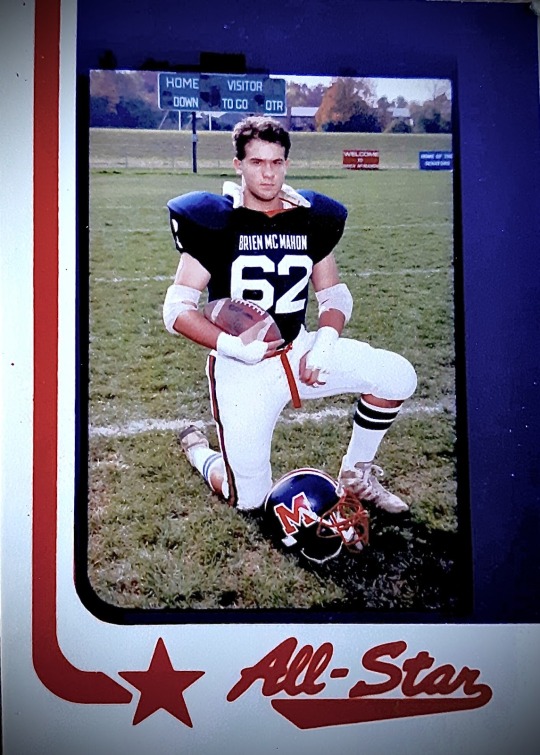
Pete’s yearbook photo in his senior year of high school football.
This quote rings true, especially with his journey as a father. His two sons, wearing the same colors as him, compete in the same sport he loves each and every day. According to Falla, he feels so lucky to have the opportunity to watch his boys play, and will be sad when that is no longer possible. Watching them compete brings a larger sense of importance to the game. "Seeing Drew and Colin out there, giving their all for the team, amplifies the sense of community and family that sports can foster," Peter shares. His job not only allows him to make a living, but also to be a father and watch his kids grow up before his own eyes.
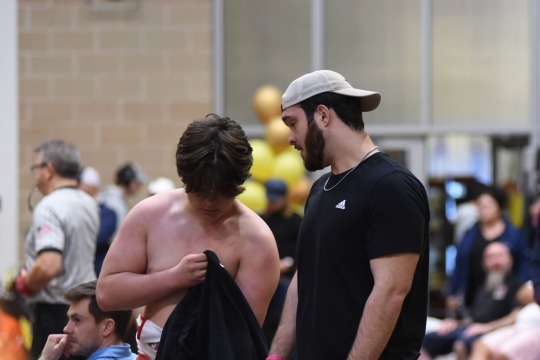
Pete’s two sons, Colin (left) and Drew (right). (Kathleen Falla Photography)
After work, the Falla family spends time with each other, bonding over their days at the various schools they reside at. The three boys in the family find themselves at Greenwich High, where Kathleen Falla, Pete’s wife, finds herself teaching first grade at Cos Cob Elementary School. She was also lucky enough to witness her boys in action, except in her case, she saw the educational and social aspect of it. Their time together as a family is what motivates Pete to keep pushing.
Peter's story is a narrative of balance, dedication, and love—a testament to the impact of intertwining one's passions with family and community. As he looks forward to another day, the personal fulfillment gleaned from his sons' achievements on the field and his own contributions off it reaffirm the indelible mark he makes on the lives he touches, both as an athletic trainer, a physical therapist, and a father.
Pete Falla is beloved by his community, and for good reason. Always rocking his signature smile, Pete makes sure to shed a positive light on any situation. He often receives chants from Greenwich’s student section such as, “Pete the Trainer! Pete the Trainer! Pete the Trainer!”. This just goes to show what being a good trainer and an even better human does for a community, and how life has it’s way of rewarding those who strive to make the world a better place.
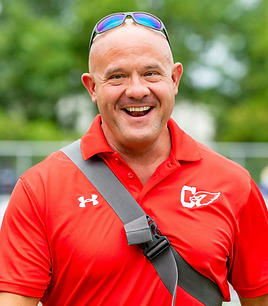
Pete’s signature look (ons.com)
0 notes
Text
Football: More Than Just a Game
Interview with Bobby Walker, Jr. by Drew Falla
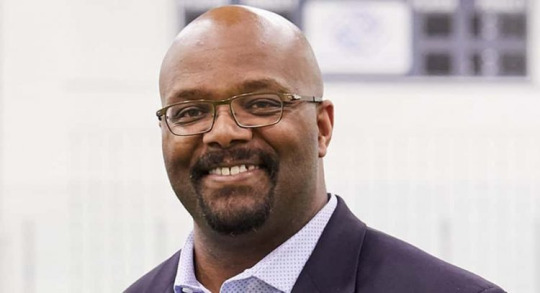
Bobby Walker Jr, born in Dallas, Texas, grew up around football, and puts his understanding of young minds and athletics to work. Growing up around football, Walker always had a love for the sport. It wasn’t until he turned 12, where he put on a helmet. This decision would change his life forever. He would go on to play college football, and coach after. Starting a young family before moving to Greenwich, CT, was a challenge. However, Walker looked to sports in order to help his kids develop. Working in the education systems across Texas and Connecticut, he learned a lot about the ins and outs of sports and how it ties in with the classroom. Walker, after coaching for some years in Texas as a defensive coordinator and line coach, decided to continue coaching at the youth level in Greenwich. Working for the GYFL as a volunteer coach for kids ages 8-14 has allowed Walker to have very unique views on the game he loves. He believes that, Working in Greenwich actually allowed him to be one of my personal coaches during my time as a young football player. I always looked upon our times together fondly, as he was truly one of the people who helped me fall in love with football. Having such an adept understanding of the game and how kids develop gives what he talks about a unique twist. He talks about football in Greenwich as a whole, as well as its benefits in school and socially. His son, Miles Walker, currently attends Ohio State and plays football there, so his experiences are touched upon a lot in this interview as well.
Q1 [00:00:56] Can you talk about what you think football means to young children and what it, what it helps them develop and stuff like that.
Bobby Walker Jr. [00:01:08] Absolutely. So first of all, I can't tell you the numerous benefits that I believe football holds for kids. And, you know, not only for young kids, but I think it's just about a sport that teaches you a lot about yourself, which teaches you a lot about life. Right? Right. So for young kids, you know, I think, first and foremost, I think football teaches discipline, which I think is really important. Right? The discipline of coming to practice every day, of having all of your gear and learning how to line up on what you think of there are, at the most basic level, it teaches discipline. But when you go further, it begins to teach you about, you know, teamwork and working together and relying on other people and being relied on. And so it teaches you this concept that we're all in this together. And the more we work well together, the better off all of us ultimately are. And then, you know, I can tell you you're going to win all the time. The other thing about you is that sometimes it doesn't go right. Sometimes your goals that you want don't work. And so what do you do then? You can quit. Or you can work a little harder. Or you can change your goal, change your attack, change your approach. And the more you learn that early on, on the field, I think it just applies to everything in school home life, your grades, your job. So I love it there. And it just teaches you I know transport right. It also teaches you just to have pure, unadulterated fun. And I think in today's world, man, we need to teach kids to do that more often.
Q2 [00:02:51] So you touched on school, can you mention a little bit more about how football helps with school? And maybe, you know, why it's important for young kids to not just get into just football, but sports in general and how that can help with their education.
Bobby Walker Jr. [00:03:08] So there are a couple of things, man, that you need to keep in mind. Right. And so some of this unfortunately you did ask the wrong person because I'm also a teacher and an educator. So I do a lot of studies about some of this stuff. Right. So all of those basic level, I think that like I said, it teaches you discipline. So if you're going to play a sport, particularly the older you get, time becomes abstract and you got to learn how to utilize the time. You have to do all the things you watch. So that includes how do I get my school work done, how do I practice, how do I live, how do I train? And so the older you get and the deeper you get with sports, you find yourself working on these schedules and you become really rigid about it. And you learn that I can squeeze everything I want. If I can learn how to manipulate and manage my time well, at least for me, that was one of the best things I learned. Even in high school, I knew that I was going to practice to X amount of time, and I lived pretty far away from home, so I knew I'd get home by this time and then it would take me this much time. So I'd always been thinking about my schedule. And how to, you know, use my schedule to my advantage. But also I'm switching things that I wanted to do, how to go have fun on, how to be with my friends, but also how to make it to the weight room and sometimes everything. So sometimes you know what I mean. So that's part one. But the other part of the number of studies is just talk about the connection between being physically fit and learning about movement and learning. You know, sometimes I know it sounds corny, but like if we had some training to do, instead of focusing on how hard it was and think about a test later that day, and as your body is exercising, you're able to retain a lot of the information that you're trying to cram into your brain a little bit. You know what I'm saying? So that's how I used to do that when we did gases, right? Instead of think about the gases, I try to think about work or I think about a history test, or I think about math problems or something as a way to try to get that deep into my memory.
Q3 [00:05:11] You mentioned being in the, education field and you talk a lot about football. Can you talk about what you do for a living and what, like go into detail about each thing that you've done? I know you've been a coach and I work in the Education Boys and Girls Club. So can you touch on that?
Bobby Walker Jr. [00:05:29] I was fortunate enough to be able to play football in college, but my going to a Division three school, I was able to also play another sport I love. Track and field hockey were shot put, discus and they learned how to put the hammer in college. So sports literally I did sports. You know, you think of weekends on that college 85% of all weekends. I had a competition. And you know, for track and field, you know what I'm saying. So that's how much I love sports. And then when I left college aged 22, I went straight into teaching. So I went back to my hometown in Dallas. And I taught fifth grade humanities at an all boys private school. But I also was forced to be a coach where I did a lot of defensive coordinator stuff. But I also work even with the O-line, the D-line or the linebackers or sometimes all three, you know, just depending on what the team needed and what coaches we had on staff. And so when I left, I worked in Dallas from 95 to 2000. Then I left there and moved to Maryland. So school called McDonough school and then went up the McDonough school. There was a middle school, Dean Ambrose, who taught history as well. So I taught seventh grade and then eighth grade history. They both, were making history, different parts of it. But I was able to coach J.V. football, a little varsity football. And then it also comes fast track. And one year I go out periodically helping the beat. Great football team do whatever they needed to coach for day. So, you know, again, you know, you can see sports always played a role in where it went. We were there from 2000 to 2005 that we moved to Connecticut and in Summer 2005, I became the head of middle school for the middle school principal at Haywood Summer School in Stamford. I was there for nine years and I always worked with the football team. I couldn't do it full time, but I would do it and I would coach, the offensive line and the defensive line. And then every Saturday, I was sort of the spy in the sky, always in the press box, looking down their formations and helping a whole line coach try and identify places. And, you know, any time I do, I would move. And then on the defensive side of the ball, my job was to not only look at those patterns, but were there like any kind of clues that they would give us, like as one team, every time the running back didn't get the ball, he was upright, a two point stance. Every time he got the ball, he was down in the three point stance. You know, that was my job. I was like, find those patterns and then try to lead up to the defensive coordinator. Right? Right. And then, when I go to the Boys and Girls Club in 2014 and not being able to go to school, that's what gave me time to jump to the GSM. I wasn't working at a high school anymore, and so I was able to dedicate my time to helping young people get ready for football. So for the six years that I was at the Boys and Girls Club, you know, I coached, I think I coached at the junior level for four years and then senior level for two, and that was a lot of fun. Then when I moved to Greenwich Academy in 2020, I think that was sort of the end of my coaching career.
Q4 [00:08:52] I was coached by you on the Cos Cob Crushers. Do you have any unique memories from our time together, on the Crushers staff, or Miles this time or anything? Could you just touch on those experiences and what it meant to you?
Bobby Walker Jr. [00:09:13] Where do I start? The first thing I remember. I remember when I first started coaching and I was teaching people. Were you probably I don't know what you guys, we call it one step through it. We literally take one step to make sure you're in good position right? And doing it over and over and over and everybody is like, this is boring, coach, can we do more? And me trying to get you guys to buy into the system that this is going to work. I promise you it's going to work. And then as you guys got older, by the time we got to game time, all of a sudden we realized that it didn't work like that. And just the way in which, you know, you play on a team for two years and for Miles, he's a year older than you are, right? It was cool that every time you all came together, y'all won as bantams and then, you know, the juniors, they didn't win. You guys moved up. The next year we won. After juniors even went to seniors. You guys weren’t there, they didn't win. You guys moved up. And so what I realized was that I had this really unique combination of guys with Miles and Cliff and then you Teddy and Jake, and what it was was by the time you guys got to me, you know, that's what I was trying to do. And that became fun. Y'all saw it y'all again to see what it meant to move people out of the way. All of a sudden we had like the best rushing team around, you know, couple that were really good running backs. That comes from the things going undefeated man. You know Miles’ last year you guys just dominated everybody. So you know guys that were really close right. Right. And this is sort of was like bragging when other coaches came to me to tell me how good the line was. And everybody kept saying it was because you guys were big and y'all were. But the truth is, man, I have another coach who understands football. And he goes, man, you get those guys are really well coached. And that was the biggest thing. That was the biggest compliment to me is that you you guys are big. But I'm a huge fan of big guys too. But they were big. They weren't good. You guys were big. You were good. You were athletic. And y'all worked together as a unit for sure.
Q5 [00:11:29] Can you just talk about the connection between the GYFL, and either Greenwich High School or Brunswick or both, and what it means to each respectfully.
Bobby Walker Jr. [00:12:05] Let me tell you, man. So the GYFL has a lot of respect in particular from the high school level programs in this area. Whether it's Greenwich, it's Brunswick, or Greenwich Country Day. Every time I talk to a coach from there, and I mean, one of my favorite things I loved as a coach was when all those high school football coaches came out. And what it did, man. And you were one of the games where it was like a community event, right? Right. Not so much that it was just a bunch of boys. But then you have the guys that used to play. They come out, you know, guys that, you know, played ten, 15 years ago, come out in their jerseys every once in a while to come watch the teams. Obviously they have their own kids. There's the level of pride that you have there, you know. And that was cool to be there. And so it took a little while. I remember when Miles was in middle school. And, you know, for Brunswick. And so I probably could get in trouble for people who would come to Brunswick. Right. I kept trying to tell the coach from Miles in middle school. I knew him personally. He was a good friend of mine. I'm like, listen man, there is some serious talent on this roster, right? And you need to come check this up. Even if he's not trying to recruit people, at least come watch your Brunswick boys play and see how well they're playing the game and how well they know the game. Right? So it wasn't about recruiting. It was about coming to support those kids who play at Brunswick, who live in Greenwich, who work out there every single weekend, three days a week, you know, practicing. And so I remember the first time, his name was Coach Sean Gerard signed. And when Gerard came over, him being blown away by the level of skill that was out there and what he saw. It was actually really good football. And that was one of the first things he said to me, man, those kids are really well coached. And then all of a sudden I think Brunswick now comes out. And again, it's not always about your support. Take people away from the public school. A lot of people see that's what's going on. It's actually not what it is. A lot of coach, too, to support those boys at Brunswick, because he wants to see, you know, who are we at school? All right. So that was really fun for me, man. And then, you know, I got on the GYFL board. And so being able to sit with those guys, and it was women talking about the program and how we, you know, bigger impacts on boys. That was really cool to me.
Q6 [00:14:30] Can you talk about some moments where you may have seen a challenge in the population of the league or the amount of kids who signed up, or if there were any challenges with rules or, an uproar from the community with any issues that they had or any moments where you might have experienced, some difficulty.
Bobby Walker Jr. [00:14:58] We had some big scares in the league, right? The first one being when the first reports, were being recorded in the NFL anaboutd a connection between CTE and people constantly having head collisions and working those windows and people. A lot of parents, parents and the number of kids dropped to really dangerously low levels to sustain, you know, six teams with three levels each. And so as a team. We have to talk to parents, but be very honest. You know, we weren't going to say, oh, he's not real, right? We're not going to tell falsehoods, but we have to talk about what things were we doing as coaches to try to make sure that we're stable young boys heads. Right. And so, you know, this whole movement went out to cause youth football in general. Coach, you behaved out of the game. And we made it a priority that we retrained all our coaches. How to teach tackling, how to teach, blocking with all modern ways, and not from the, you know, those of us who played in the 80s and 90s where you were taught to be with your head. And so I thought that was actually really cool, not only as a come closer community that we come into that, but you saw the GYFL as a team, try to get everybody to commit to this new way of teaching. And so it became mandatory that if you were a coach, you also had to be certified. And, you know, while I was in youth football, I forgot the name of the, Federation, but we all had to be certified. And if you are certified, you could not get on the sideline. Coach. I thought that was a genius move. I thought it was a great way to to acknowledge the fears that people have and, and and to acknowledge what the studies were revealing. But it was also a way to, let us know that we do have your best interests in mind. And no, we're not going to put him in any kind of, you know, life threatening, life changing situation. So that was one. And then obviously the biggest one recently being just Covid and how that we, you know, how we conduct how we conduct practices during Covid, how we keep kids safe during Covid. You know, that was a big major challenge where like and there was just one of the guidelines were allowed to operate under was the high school and other people doing so? You know, things like that.
0 notes